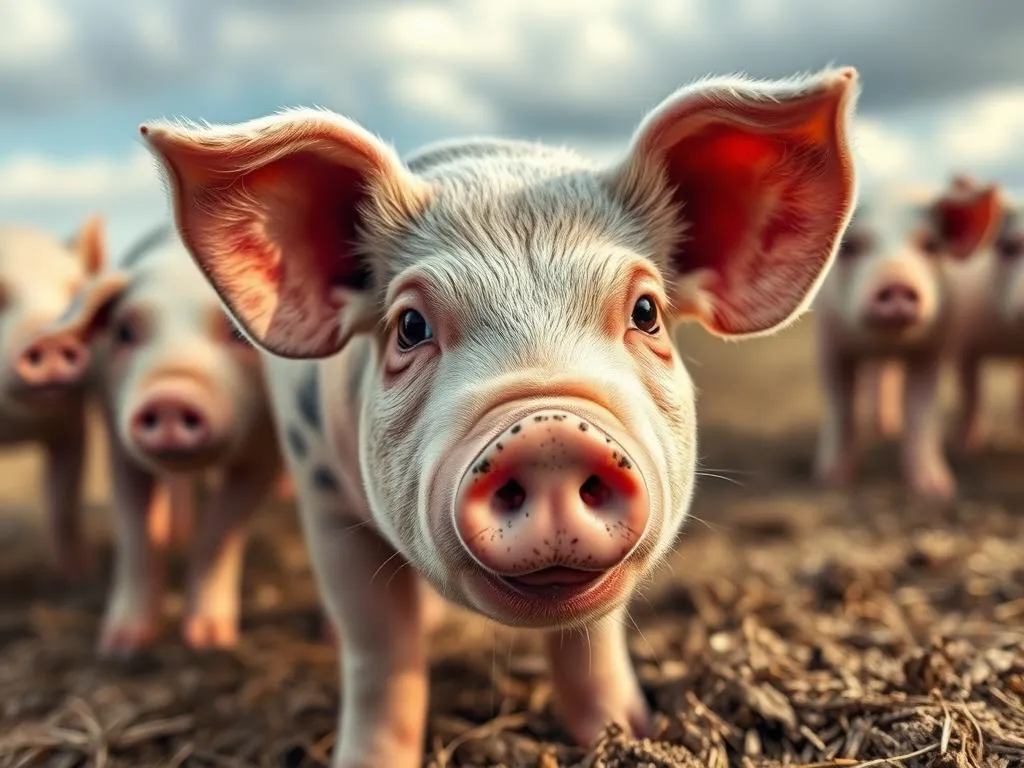
The intelligence of animals has always intrigued humans, sparking debates and discussions about the cognitive abilities of our four-legged companions. Among these discussions, a fascinating question arises: are pigs smarter than dogs? This inquiry leads us down a path of understanding not just the intelligence of these animals, but also how we perceive them in our lives and society.
Understanding animal intelligence is crucial for several reasons. It can influence how we treat pets and livestock and reshape our views on animal welfare and rights. While dogs have long been celebrated as man’s best friend, recent studies indicate that pigs may possess comparable, if not superior, intelligence.
Understanding Animal Intelligence
To delve into the question of whether pigs are smarter than dogs, we first need to define what we mean by intelligence in animals.
Definition of intelligence in animals
Animal intelligence encompasses various cognitive abilities that allow them to navigate their environments, solve problems, and interact socially. These abilities can be categorized into several types:
- Cognitive abilities: Refers to the mental processes involved in gaining knowledge and comprehension, including reasoning, judgment, and problem-solving.
- Problem-solving skills: The capability to find solutions to obstacles or challenges that arise in their environment.
- Social intelligence: The ability to interact with others, understand social cues, and communicate effectively.
Different types of intelligence
Beyond the basic definitions, animal intelligence can be split into distinct categories:
- Emotional intelligence: The ability to understand and manage emotions, both their own and those of others.
- Adaptive intelligence: The capability to adjust to new environments or changes in circumstances.
- Instinctual intelligence: Innate behaviors that enable survival without prior learning.
Intelligence in Dogs
Dogs have been by our side for thousands of years, developing a unique bond with humans. Their intelligence is often showcased in various roles they play in our lives.
Overview of dog intelligence
Historically, dogs have been domesticated for various purposes, from hunting and herding to companionship and service. Certain breeds are recognized for their intelligence, such as:
- Border Collies: Known for their incredible herding skills and ability to learn commands quickly.
- Poodles: Highly trainable and often excel in obedience competitions.
Measuring dog intelligence
Dog intelligence is typically evaluated through several methods:
- Learning speed and obedience: How quickly a dog can learn new commands and tasks.
- Problem-solving tests: Challenges that assess a dog’s ability to navigate obstacles and find solutions.
- Social learning and communication: The ability to understand and respond to human cues or other dogs’ behaviors.
Examples of canine intelligence
Dogs demonstrate their intelligence in various ways:
- Service dogs: These animals are trained to perform specific tasks for individuals with disabilities, such as guiding the visually impaired or alerting to medical emergencies.
- Competitive sports: Many dogs participate in agility, obedience trials, and search-and-rescue missions, showcasing their problem-solving skills and ability to learn complex tasks.
Intelligence in Pigs
Though often underestimated, pigs are surprisingly intelligent creatures with cognitive abilities that may rival those of dogs.
Overview of pig intelligence
Pigs have historically been valued as livestock for their contributions to agriculture. However, certain breeds, such as Yorkshire and Berkshire pigs, exhibit remarkable intelligence and adaptability.
Measuring pig intelligence
Pigs’ intelligence can be assessed through various tests:
- Learning speed and problem-solving abilities: Research shows that pigs can learn tasks quickly, often outperforming dogs in certain cognitive challenges.
- Use of mazes and puzzles: Studies involving mazes and food rewards demonstrate pigs’ problem-solving skills and memory capabilities.
- Social structures and communication: Pigs have complex social networks and display sophisticated forms of communication, indicating high levels of social intelligence.
Examples of porcine intelligence
Pigs exhibit their intellect in various contexts:
- Foraging skills: In natural settings or farms, pigs demonstrate remarkable abilities to search for food, using problem-solving to access hidden treats.
- Agility training: Some pig owners train their animals in agility courses, showcasing their capacity to learn commands and navigate obstacles.
Comparative Studies on Intelligence
To truly determine if pigs are smarter than dogs, we need to look at comparative studies that examine both species’ cognitive abilities.
Research findings on pig vs. dog intelligence
Several notable studies have attempted to measure and compare the intelligence of pigs and dogs through cognitive tests and behavioral assessments. These studies often focus on:
- Problem-solving abilities: Researchers design tasks that require animals to find food or navigate mazes, evaluating their efficiency and learning speed.
- Memory and learning capabilities: Tests may involve recalling past experiences or recognizing patterns.
- Social interactions and communication styles: Observing how each species interacts with humans and their peers provides insights into their social intelligence.
Key findings
Research has yielded some intriguing results, indicating that pigs often excel in certain areas:
- Problem-solving abilities: In various studies, pigs have demonstrated superior problem-solving skills compared to dogs, often completing tasks faster.
- Memory and learning capabilities: Pigs show impressive long-term memory and can retain information for extended periods, which is crucial for survival in the wild.
- Social interactions: Pigs exhibit complex social behaviors, showcasing their ability to communicate and form bonds within their groups.
Implications of Intelligence Comparisons
The discussion surrounding whether pigs are smarter than dogs extends beyond mere academic interest; it has significant implications for how we view these animals in society.
Impact on species perception
As research sheds light on pig intelligence, our perceptions are beginning to change:
- Changing views on pigs in agriculture: Understanding their cognitive abilities may lead to more humane treatment of pigs in farming environments.
- Reassessing the role of dogs in human society: Likewise, recognizing the intelligence of pigs could prompt discussions about the roles of various animals in our lives.
Ethical considerations
The comparison of intelligence raises important ethical questions:
- Animal welfare: If pigs are proven to be highly intelligent, it may necessitate better living conditions and treatment in agricultural settings.
- Animal rights movements: Growing awareness of animal intelligence may bolster arguments for animal rights, advocating for the humane treatment of all species.
Potential for pigs as pets
The increasing recognition of pig intelligence opens up discussions about the feasibility of keeping pigs as companion animals:
- Benefits: Pigs can form strong bonds with humans, displaying affectionate behaviors similar to dogs.
- Challenges: However, potential pet owners must consider the care needs of pigs, which can differ significantly from those of dogs, including dietary requirements, space needs, and social interactions.
Conclusion
In exploring whether pigs are smarter than dogs, we uncover a complex tapestry of intelligence that challenges our long-held beliefs. Both species exhibit remarkable cognitive abilities, yet they manifest in different ways. Dogs excel in obedience and social learning, while pigs showcase impressive problem-solving skills and emotional intelligence.
Understanding these intricacies reminds us to appreciate all animals for their unique qualities. As we learn more about animal intelligence, we can make informed choices about how we treat and interact with the creatures that share our world.









